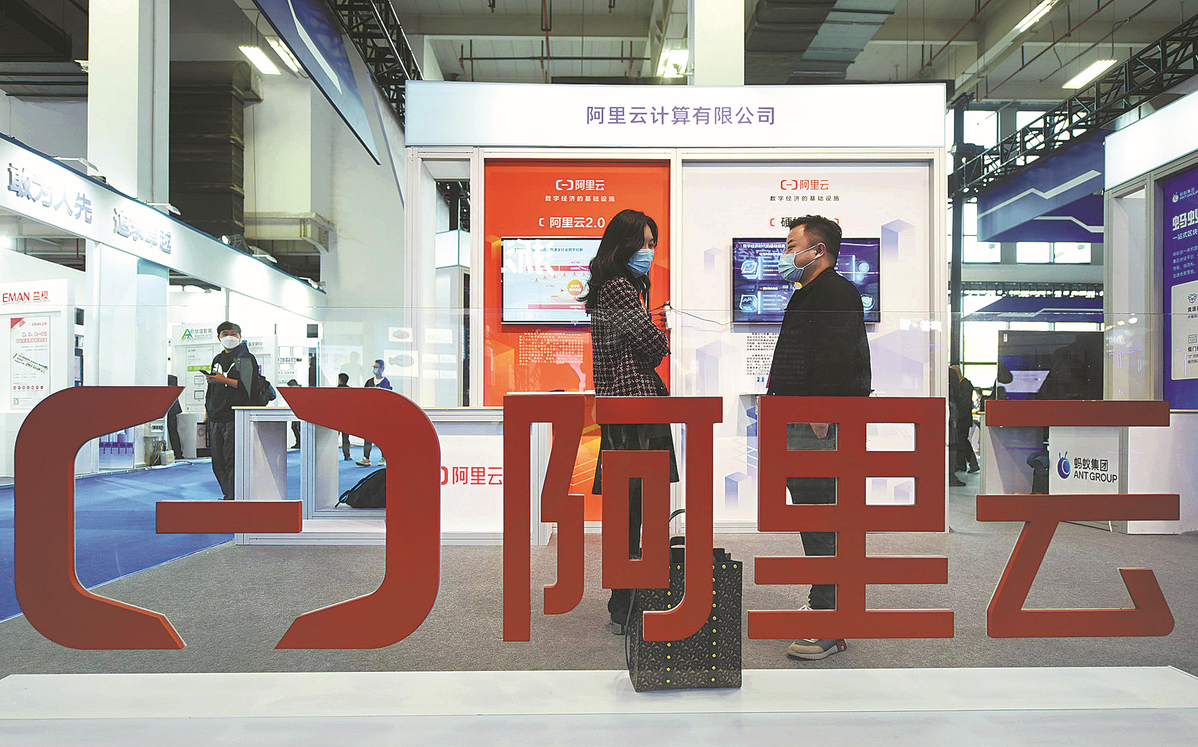Tech giants look to bolster industrial digitalization

The booth of Alibaba Cloud during an expo in Hangzhou, Zhejiang province. LONG WEI/FOR CHINA DAILY
Chinese internet and tech heavyweights are stepping up efforts to invest more in cloud computing and enterprise-oriented business, and leverage cutting-edge digital technologies to bolster industrial upgrade as part of their broader push to promote in-depth integration of the digital and real economies, experts said.
"Our biggest opportunities lie in establishing ourselves in the real economy and bolstering the deep integration of the real and digital economies," said Zhang Yong, chairman and CEO of Alibaba, during financial program Dialogue on China Central Television on Saturday.
Zhang said he is delighted that the country has high hopes for the platform economy and the Central Economic Work Conference stated that platform companies will be supported to "fully display their capabilities" in bolstering economic growth, job creation and global competition.
Zhang regards it as a vote of confidence, though there is still a long way to go to better shoulder such a responsibility, adding that the company's development goals are highly consistent with those of the country and society, which is Alibaba's biggest source of confidence.
The company is ratcheting up efforts to utilize digital technologies to help small and medium-sized enterprises and accelerate industrial transformation in an effort to better empower the real economy.
The cloud computing sector, which is regarded as a key enabler for industry digitalization, is playing an increasingly important role in Alibaba's overall business landscape. The company's cloud revenue, a main growth driver alongside e-commerce, rose 4 percent year-on-year and 17.37 percent quarter-on-quarter to 20.76 billion yuan ($3.03 billion) during the July-September period.
Revenue growth from non-internet industries driven by financial services, telecommunication and public services industries, continued to improve, growing 28 percent year-on-year and contributing 58 percent of overall cloud revenue during the period.
Zhang said in December that he has assumed the post of acting president of Alibaba Cloud and also the company's work collaboration tool DingTalk. Meanwhile, Zhang Jianfeng has stepped down as cloud business chief and will henceforth lead Alibaba's science and technology research institute, the Damo Academy.
Cloud infrastructure services expenditure on the Chinese mainland grew 8 percent year-on-year to $7.8 billion in the third quarter of 2022, according to market consultancy Canalys. Alibaba Cloud led the cloud infrastructure services market, taking up 36 percent of total spending, followed by Huawei Cloud, Tencent Cloud and Baidu AI Cloud.
Chen Duan, director of the Digital Economy Integration Innovation Development Center at the Central University of Finance and Economics, said Alibaba's cloud business will be a key growth engine and pivot apart from its core e-commerce unit.
More efforts are needed to make full use of tech companies' advantages in big data, cloud computing and artificial intelligence to empower the digital transformation of micro, small and medium-sized enterprises and drive industrial upgrade, Chen added.
Tencent Holdings Ltd is doubling down on the cloud services and industrial internet sector, in a move to bolster digitalization of manufacturing and improve operational efficiency of enterprises.
Dowson Tong, senior executive vice-president of Tencent and president of Tencent's cloud and smart industries group, said the company will continue driving innovations for enterprises to boost their digital competitiveness. In the third quarter of 2022, Tencent's revenue from fintech and business services grew by 4 percent on a yearly basis to 44.8 billion yuan.
"Going forward, we will continue to invest in the global market for our cloud and software businesses and expand our overseas infrastructure coverage, developing local integration and service partnership networks," Tong said.
Tencent has developed its industrial internet platform WeMake, with an aim to help manufacturing enterprises quickly build data-driven smart factories, and improve the digitalization of enterprises' operations, manufacturing processes and equipment management.
Zhu Keli, founding director of the China Institute of New Economy, said industrial internet platforms have great potential to bolster the integration of digital economy and real economy, and empower enterprises through technology, data, finance, infrastructure and other element resources.
There is an urgent need to promote the digital transformation and upgrade of Chinese enterprises through the industrial internet, which will play a critical role in propelling production, optimizing resource allocation and improving operational efficiency, said Pan Helin, co-director of the Digital Economy and Financial Innovation Research Center at Zhejiang University's International Business School.
Photos
Related Stories
- Intelligent logistics gives a boost to China's development
- Intelligent markets make shopping more convenient
- Digitalization key to Africa's development: UN official
- SMEs build "cloud plants" to advance digital transformation
- NE China's company accelerates digitalization to promote smart production
- Financial digitalization gets e-CNY trust
Copyright © 2023 People's Daily Online. All Rights Reserved.









